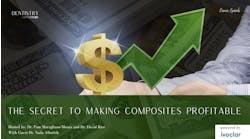About six months ago, as I was flipping through dental journals, I saw an ad that used the word "recession." It was designed to scare dentists into “buying now.” To me this signaled that dentists who have been voraciously reading and watching every news item about a possible economic downturn are prime candidates to panic and blame the economy for all that’s wrong with their practices.
It’s easy for dentists, as small business owners, to get wrapped up in the drama of the news headlines and blame their practice problems on the economy. In my 30-plus years as a dental consultant, I’ve heard about the ills an economic downturn can create. I’ve learned that dentists who actively engage in their businesses can survive and (dare I say it?) prosper during any economic twist and turn.
Dentistry is relatively recession-, depression-, and any-other-type-of-financial-disaster-proof. Why? Functional or cosmetic dentistry is always wanted and needed by people. There will always be patients who want ideal oral health and can find the means to pay. In contrast to medicine, dentistry is defined as high frequency/low cost. If we compare quadrant dentistry to how much an emergency room charges for two Tylenol and an x-ray, the facts are clear.
Most important, even if there’s currently an economic downturn, there are the baby boomers. We boomers are not growing old gracefully. We’re at our highest level of need, and restoring function and maintaining esthetic excellence is one of our tools for hanging on to youth. It’s your job to find these patients, learn what they need and want, and present dental solutions they will commit to and value.
Related articles
How to recession-proof your practice
Dealing with the inflation factor
It’s the dentist’s decisions, made in a panic, that create scarcity, chaos, and failure in a practice. For example, the advertisement that used the word "recession" was for an item a panicked dentist might purchase as a silver bullet for a bad month. I’m not judging the value of the advertising campaign; I’m judging the dentist’s decision to purchase based on fear and with no plan. Without a consistent brand identity, planned strategy, or proactive focus on the ROI, the chances of a successful panic campaign are slim. As a cash flow crisis consultant, I can honestly say every dentist I’ve worked with who was being crushed by massive past due payables and large credit balances started with a bad month followed by a bad decision or two.
So, what’s a dentist to do when they fear scarcity? There are four distinct, proactive actions to not only protect your practice from economic instability, but also to ensure success. I am 100% certain that by following these steps, no one has to lose.
1. Know your numbers (statistics)
That’s a general statement, so to make it more specific, which numbers are most important during economic slowdowns? Since scarcity very often trips a dentist’s desire to see an immediate increase in new-patient flow, it’s vital to know:
- Your regular active patient base (any patient seen for anything in the last 18 months, counted once)
- Your new-patient numbers
- Your treatment presentation numbers
- Your traditional production, collection, and expense numbers
These statistics are essential so that you, as a business owner, can make informed decisions based on sound strategies, not judgment. For example, if you feel you need 30 new patients a month and are willing to spend $60,000 to $100,000 a year to get them, how do you know when you’ve returned your investment? Are those 30 patients presenting the kind of dental needs that fit your practice’s vision? Are they committing to treatment, following through on financial arrangements, and referring others? If a dentist doesn’t know the answers, they could have hundreds of new patients and wind up producing less and realizing no true ROI.
2. Know your patients
Don’t assume anything. There’s nothing worse than a dentist diagnosing a patient through their pocketbook. The only way a practitioner can find out what motivates patients is to ask questions, show empathy, and create a treatment plan that accommodates their needs. Sometimes you need to acknowledge a regional issue. Many of our dentists who have experienced regional and economic downturns have sent state-of-the-nation letters as a proactive marketing tool. These letters assure patients that even in uncertain times, their dental office will deliver the best care and address economic obstacles by offering flexible financial arrangements. Your relationship with your patients is your strongest goodwill. Patients who trust you will always rise above financial concerns to achieve optimal oral health.
3. Adapt your systems
Some dentistry can be completely discretionary (i.e., cosmetic dentistry). In an unstable environment, patients may say maybe to discretionary care, but yes to functional or basic oral health necessities. Instead of targeting 12 full-mouth reconstructions per year, a practice may need to do two dozen $3,000 to $5,000 cases instead. A flexible dentist may need to change their marketing, new-patient screening, new-patient process, or treatment presentation for existing patients to address the concerns of the day. Financial arrangements may need to become more flexible, and insurance processes may need to become more efficient. All should be addressed proactively versus reactively.
4. Stay the course
The good news for dentists is that while other businesses can truly fail when the economy shifts, dentists can flourish and prosper if they do the right things for the right patients. A bad month does not automatically mean a bad year. If three patients say no, this doesn’t mean that the fourth patient will also say no. If they’ve worked before, your goals and strategies can work again. So don’t hit the panic button; re-engage with your business proactively and respond to outside influences and you can be successful and never fear the word "recession" again.
Editor's note: This article appeared in the February 2023 print edition of Dental Economics magazine. Dentists in North America are eligible for a complimentary print subscription. Sign up here.






